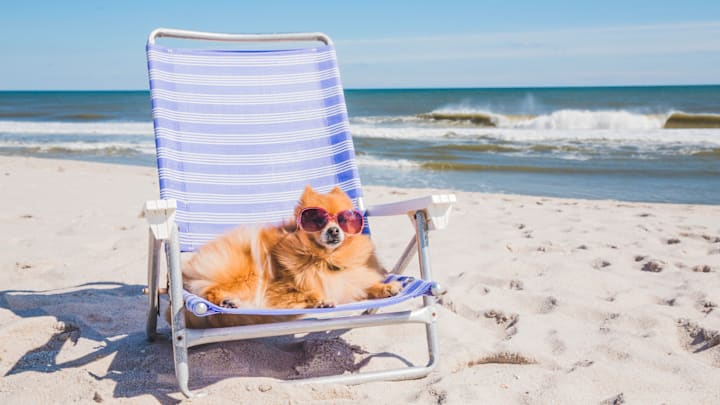Many doting pet parents know the importance of keeping dogs hydrated and protecting their paws on hot summer days. Sun protection for pets is more of a mystery. Even after putting on their floppiest hats and slathering themselves with sunscreen, dog owners may not think to take similar precautions with their four-legged companions. Though it’s not always noticeable, dogs do get sunburned, and it’s important to take the right steps to keep them safe and comfortable.
According to the American Kennel Club, the dogs most at risk have ample exposed skin and thin coats of light fur. The Xoloitzcuintli, Chinese crested, and American hairless terrier are famously furless on most of their bodies, and therefore need the most protection when exposed to strong sunlight. However, even the hairiest dogs aren’t impervious to the harmful effects of the sun. The skin on their noses, bellies, and the inside of their ears is still bare, and these areas are especially vulnerable if the fur around them is light-colored.
Dog who have spent too much time in the sun may see their exposed skin become red and flaky. Your pet may try to itch the burned area or be extra sensitive to being petted. If you suspect your dog is suffering from a sunburn, contact your vet right away to discuss the best treatment options.
Sunburns are more than uncomfortable for canines. As is the case with humans, repeat sun damage puts dogs at risk for certain diseases such as skin cancer. Fortunately it’s easy to protect them from the elements. If you’re planning a beach day with your pup, stock up on canine sunscreen that’s safe for dogs to ingest. Sunblock that contains zinc oxide or para-aminobenzoic acid should never be used on pets, as it can make them sick if they lick it. Apply the lotion where their fur is thinnest—like the nose, groin, belly, and tips of the ears—then reapply every four to six hours.
Another option for protecting your dog during the summer months is to limit their sun exposure in the first place. If you plan on spending the day outdoors with your furry friend, bring a tent or umbrella or scope out some other shady spot where they can relax. You can also use their built-in sun protection to their advantage. Their fur coat may look hot to you in the middle of July, but remember that it’s a natural sun shield and temperature regulator and it shouldn’t be shaved off at the groomers.
